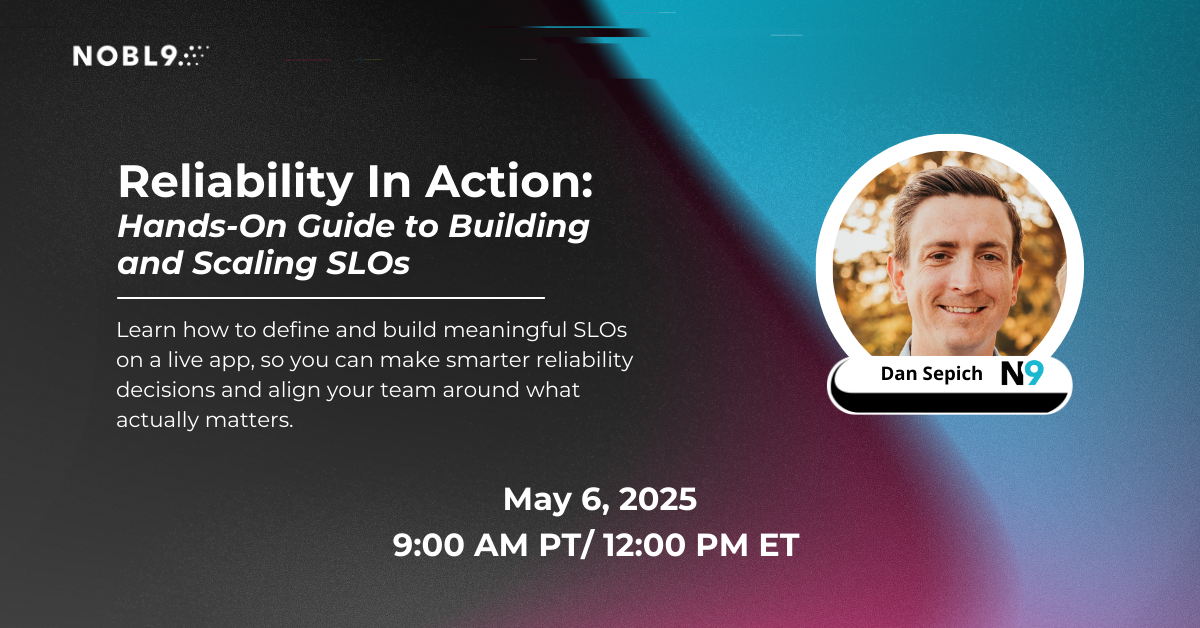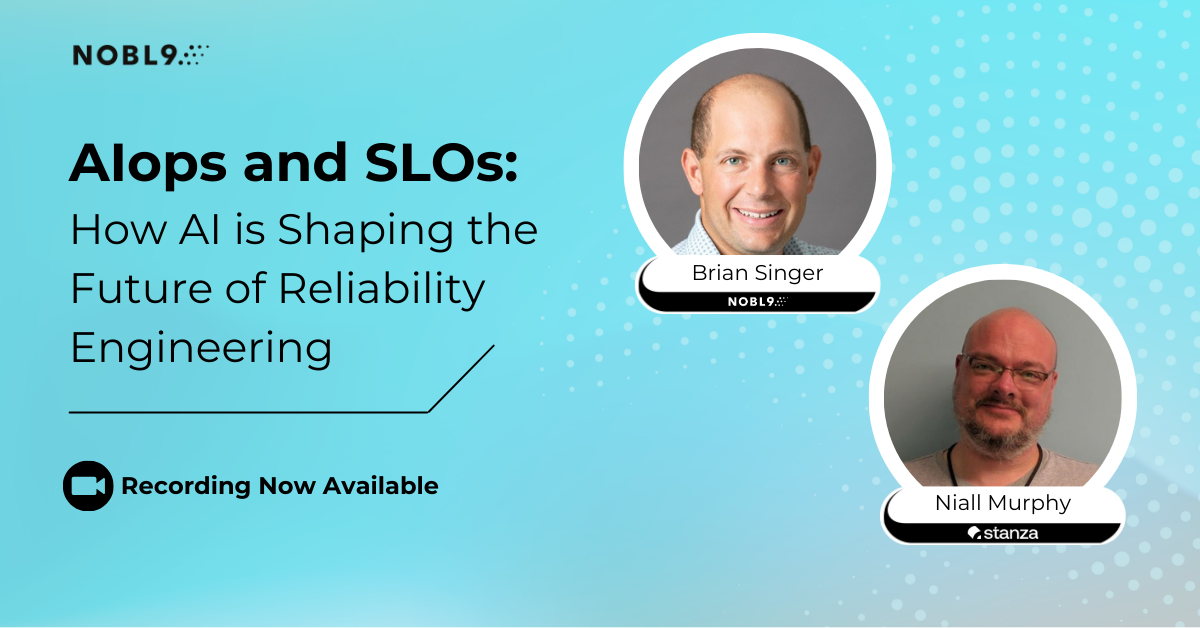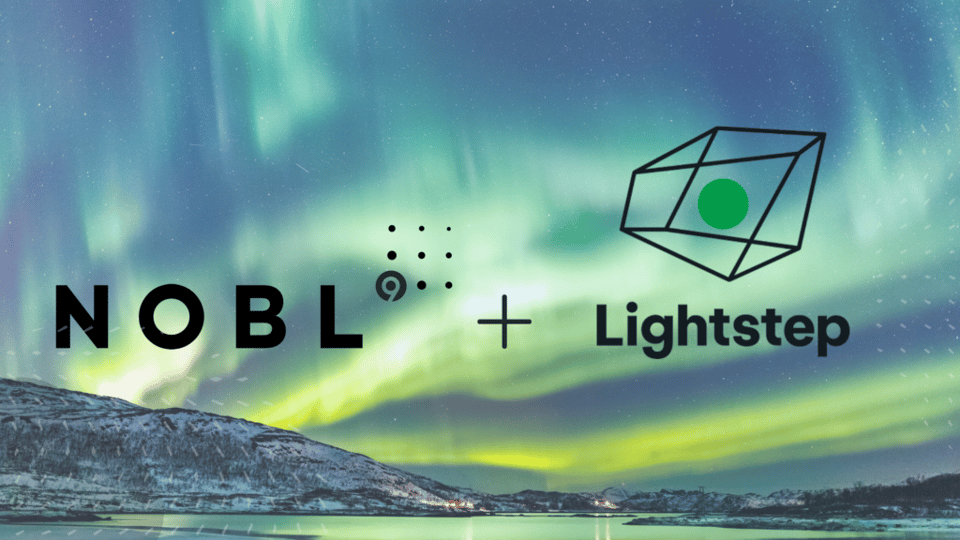More by Kit Merker:
Nobl9 & Adobe Systems: Let’s Talk SLOs for OpenStack Delivering the Right Data for Better SLOs with Nobl9 & New Relic The Ultimate Guide to Reliability Talks at re:Invent 2020 SRE 101: The SRE Toolset Nobl9 Has Joined The Cloud Native Computing Foundation Nobl9 and Datadog: Better Data Makes Better SLOs Measuring and Optimizing CPU Performance| Author: Kit Merker
Avg. reading time: 2 minutes
UPDATE: Nobl9 is now GA. Try it today
Press release: November 5, 2020
Joint development effort to help engineers use real-time distributed data to design better SLOs and monitor software performance for better end-user experiences.
BOSTON and SAN FRANCISCO, November 5, 2020 — Nobl9, a Boston-based software reliability platform startup, and Lightstep, the San Francisco-based observability company that has pioneered the cutting-edge practice of ‘distributed tracing,’ today announced an integration partnership in which the two companies will add support for the Lightstep core distributed tracing technology to Nobl9’s SLO platform. The effort enables organizations to establish service level objectives from performance data captured through distributed traces in the Lightstep platform.
Good SLOs are built on the economic value to the organization of successful service delivery.
Distributed tracing, the technology at the heart of the Lightstep observability platform, is used to rapidly pinpoint the causes of failures and poor performance across the deeply complex dependencies among services, teams and workloads in modern production systems. SLOs—service level objectives—are strong, understandable goals that applications will run reliably and with adequate performance. What makes SLOs uniquely valuable and powerful is that they encode technical and business priorities in terms that are easy to understand, built by a collaborative team of application developers, product managers, IT operators and other business stakeholders. Using distributed tracing data as an input to the SLO process gives application developers and operators the ability to construct SLOs that reflect service dependencies and validate them with live telemetry from the application.
Users of services—whether they are human or other services—have expectations about how reliable these services are, and those expectations vary by the types of services being requested, the time of day or year those services are being requested, and how reliable similar services are from competitors. Good SLOs are built on the economic value to the organization of successful service delivery. The Nobl9 platform, presently in private beta, democratizes the process of managing SLOs so that engineers can make objective reliability decisions based on data, not conjecture or organizational folklore. When SLOs are at risk, Lightstep provides explanations of what has changed to help engineers get things back on track.
“In order for software to fulfill its promise as the only sustainable source of competitive differentiation, it has to be reliable,” said Marcin Kurc, CEO of Nobl9. “Site reliability engineering is the means by which reliable software is built and run, and SLOs are the foundation upon which SRE is built. That’s what we’re creating at Nobl9: a platform to help organizations create and manage SLOs that deliver positive reliability experience downstream, without over-provisioning or other capital-inefficient tactics that deliver negative ROI for the organization.”
“Engineers in charge of delivering reliable software crave management systems that are elegant, flexible, and save them time,” said Ben Sigelman, CEO and cofounder at Lightstep. “Engineers don’t want another maintenance headache, and they don’t want another framework or vendor that makes them bend over backwards. Lightstep and Nobl9 see the world the same way, and by integrating our systems, we’re giving our customers access to another, powerful value proposition for distributed tracing.”
The integration will be made available to participants in the private beta program for the Nobl9 SLO platform.
About Lightstep
Lightstep’s mission is to deliver confidence at scale for those who develop, operate and rely on today’s powerful software applications. Its products leverage distributed tracing technology – initially developed by a Lightstep co-founder at Google – to offer best-of-breed observability to organizations adopting microservices or serverless at scale. Lightstep is backed by Redpoint, Sequoia, Altimeter Capital, Cowboy Ventures, and Harrison Metal and is headquartered in San Francisco, CA. For more information, visit lightstep.com or follow @LightstepHQ.
About Nobl9
Nobl9, the software reliability platform startup, is in the noble pursuit of reliable software. Founded by Marcin Kurc and Brian Singer, who joined Google via acquisition of Orbitera, Nobl9 helps software developers, DevOps practitioners, and reliability engineers deliver reliable features faster through software-defined Service Level Objectives that link monitoring and other logging and tracing data to user happiness and business KPIs. The company is backed by Battery Ventures, CRV, Bonfire and Resolute Ventures and is headquartered in Boston with a distributed team. More at nobl9.com.









.png?width=1200&height=628&name=Building%20Reliable%20E-commerce%20Experiences%20(24).png)
.png?width=1200&height=628&name=Building%20Reliable%20E-commerce%20Experiences%20(22).png)
.png?width=1200&height=628&name=Building%20Reliable%20E-commerce%20Experiences%20(19).png)






Do you want to add something? Leave a comment